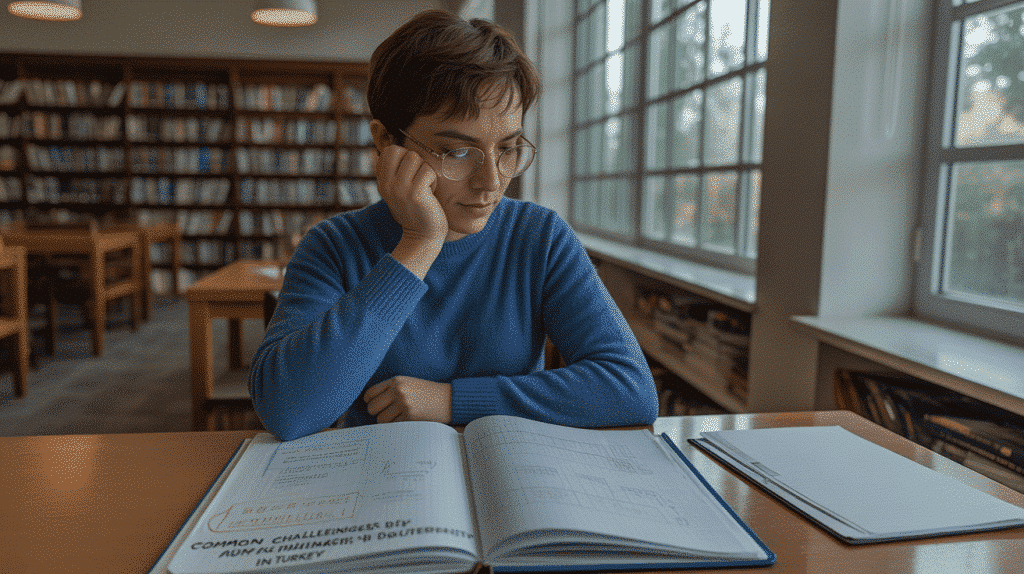Common Challenges Faced by International PhD Students in Turkiye
Language Barriers
One of the primary challenges faced by international PhD students in Turkiye is the language barrier, which profoundly affects their academic and social lives.
Medium of Instruction Discrepancy
While many graduate programs are advertised as being taught in English, the reality often differs. Students may find that courses are delivered partially or entirely in Turkish, leading to confusion and significant learning difficulties.
Recommendation: It’s essential for prospective students to clarify the medium of instruction before enrolling. Students should inquire directly with the university’s international office.
Insufficient Language Preparation
Even after completing mandatory Turkish language courses, many students report feeling inadequately prepared to handle the demands of their academic programs.
Recommendation: Enrolling in supplementary language courses or engaging in language exchange programs offered by universities like Uskudar University can provide additional confidence and competence in the native language.
Academic Potential Limitations
Language barriers can limit students’ academic potential, frustrating their ability to participate in discussions or express their ideas adequately.
Recommendation: International students should actively seek study groups or mentorship opportunities within their departments to foster language skills in an academic context.
Academic Challenges
Learning Outcome Achievement
Academics often observe that international students struggle to meet expected learning outcomes due to various barriers, including curriculum differences and instructional methods.
Recommendation: Students should communicate openly with their supervisors to clarify expectations and seek specific guidance on materials or assessment techniques used in their programs.
Class Participation
Active participation is critical for success in PhD programs, yet many international students report facing difficulties in engaging during seminars or discussions.
Recommendation: Universities like Beykent University often offer workshops on academic participation; attending such programs could provide valuable skills for greater engagement.
Integration into Local Academic Traditions
Understanding the local academic culture, including norms surrounding collaboration, presentations, and research ethics, can be a significant hurdle for international students.
Recommendation: Universities should consider implementing orientation sessions that focus explicitly on integrating international students into the local academic fabric, including workshops on existing Turkish academic traditions.
Systemic Challenges
Differences in educational approaches and grading systems compared to students’ home countries can create additional confusion and frustration.
Recommendation: Institutions, such as Istinye University, should ensure comprehensive orientation resources that cover these systemic aspects.
Practical Concerns
Accommodation Difficulties
Finding suitable housing remains a primary source of anxiety for many international students.
Recommendation: Universities like Galata University should assist international students with dedicated housing services to help navigate the rental market.
Financial Constraints
Limited finances often influence students’ quality of life and ability to focus on their studies.
Recommendation: Students should explore scholarship opportunities or part-time work via the university’s career services to alleviate financial burdens.
Work-Study Balance
Many PhD candidates face the added challenge of balancing their academic workload with part-time jobs or teaching responsibilities.
Recommendation: It is crucial for students to manage their time effectively, utilizing tools and resources offered by universities to help prioritize tasks and maintain a balanced schedule.
Take the Next Step with Study in Turkiye
Despite facing challenges, pursuing a PhD in Turkiye presents significant advantages. Join us at Study in Turkiye to explore further and enhance your academic journey.


Social and Cultural Adjustment
Separation from Support Networks
Many students express feelings of loneliness stemming from separation from family and support networks, which can negatively impact their motivation and academic performance.
Cultural Differences
Adapting to a new culture while managing the pressures of academic life can be extraordinarily challenging.
Limited Opportunities to Visit Home
Financial constraints and academic obligations often prevent students from returning to their home countries, intensifying feelings of homesickness.